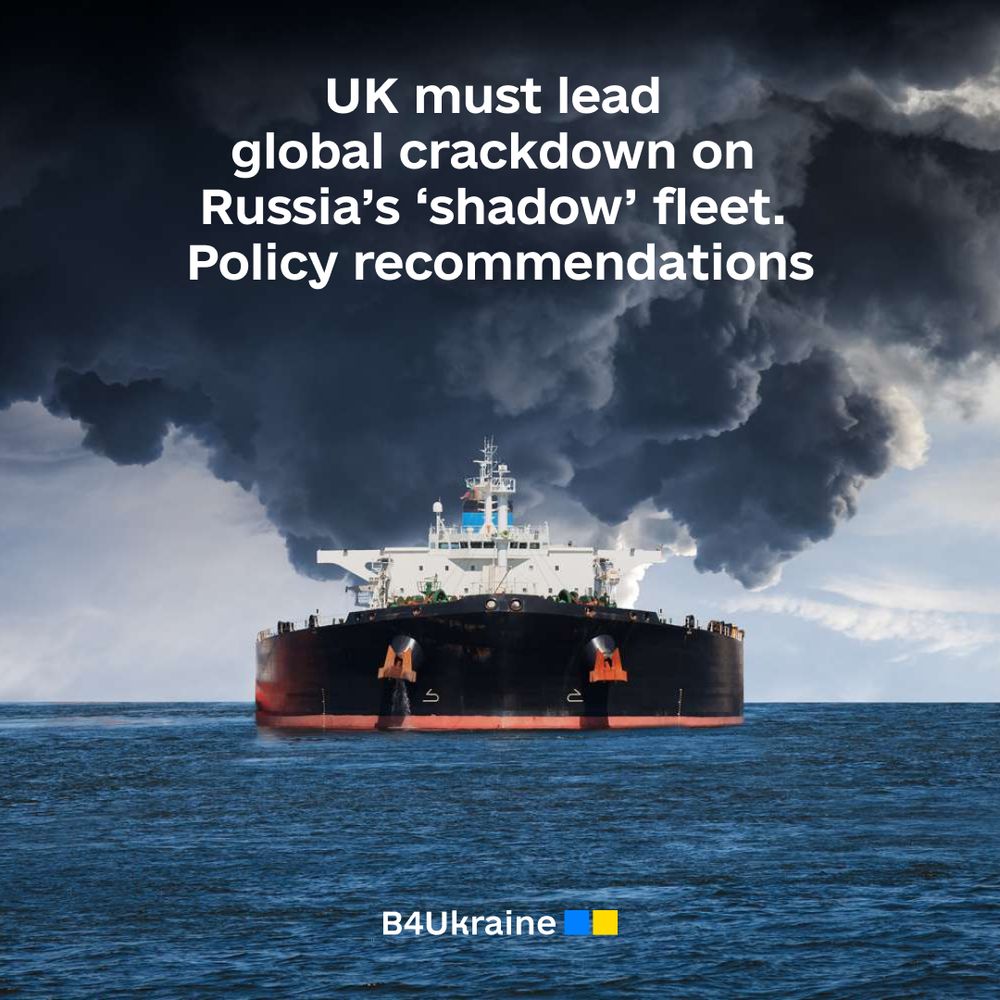
Rt Hon David Lammy MP
Foreign Secretary
Foreign, Commonwealth & Development Office
King Charles Street
London
SW1A 2AH
25th July, 2024
—
Dear Foreign Secretary,
B4Ukraine is a global coalition of 90 civil society groups united under a common goal to defund Russia’s war of aggression on Ukraine. We are writing to welcome UK leadership in spearheading last week’s Call to Action from the European Political Community Summit, and to offer further practical recommendations for how the UK can build on this political agreement to ensure its own measures against the shadow fleet meet their target.
We recognise that addressing Russia’s shadow fleet requires coordinated policy interventions across multiple government departments, as well as multilateral action with international allies and partners. The recommendations below reflect a multiprong approach to policy measures that collectively, will significantly disrupt Russia’s ability to circumvent the oil price cap while at the same time protect the UK’s coastal environment, the integrity of our international seaborne trade, and ensure respect for international maritime law.
● Enhanced targeted sanctions: Data suggests that targeted sanctions against shadow fleet vessels have significantly curtailed those vessels’ operations. To his end, we welcome the recent UK government decision to designate 17 vessels and encourage the government to align its vessel designations with the United States, which has designated 40 vessels to date. Nevertheless, it appears that a limited number of US-sanctioned vessels have resumed operations. Such operations rely on a plethora of third country service providers that often operate on the global market. To deter services from enabling operations by designated vessels, we call on the UK government to designate any persons and entities that engage with or are otherwise associated with UK-designated vessels, namely:
Vessels (and owners/operators) that engage in ship-to-ship transfer operations with designated vessels.
Ancillary maritime service providers that engage with sanctioned vessels (e.g. tugboats, port operators, storage facilities, fuel providers).
Senior crew members (e.g.: captain, navigator) operating on sanctioned vessels.
Buyers, brokers and intermediaries that deal with sanctioned vessels and their cargo.
● Environmental measures: The shadow fleet is largely made up of ageing, un(der)insured and poorly maintained vessels. Several vessels have reportedly been involved in accidents and malfunctions. It has also been reported that shadow fleet vessels may be using IMO-banned high-sulphur fuels to cut costs. With over half of all shadow fleet journeys passing through the Strait of Dover, the potential for catastrophic environmental damage to UK coasts is enormous. A major spill would also have an enormous economic impact on coastal communities and up to a billion pounds in clean-up costs. As such, we call on the UK Government to tighten and enforce environmental laws in UK territorial waters and Exclusive Economic Zone (EEZ), including (but not limited to):
Proof of adequate P&I insurance cover in territorial waters, EEZ and Dover Strait.
Enforce compliance with IMO heavy fuel standards.
Introduce and enforce tougher minimum environmental standards for oil tankers entering territorial waters, EEZ and international straits (e.g.: maximum age, enhanced inspection certificates, ban on single-hull vessels).
● Enhanced due diligence: The UK is a major hub for P&I insurance and other maritime services. Enforcement of the oil price cap is predicated on private sector actors undertaking effective due diligence to ensure the integrity of and compliance within the supply chain. P&I insurers claim that they cannot adequately verify compliance with the price cap based on current documentation and due to suspected attestation fraud. As such, we call on the UK Government to regulate for higher transparency and due diligence standards in the oil shipping industry, including requiring proof of price-cap-compliant sale contracts backed by bank-verified statements to obtain UK insurance and other services.
● Ban on Russia-linked refined oil products: Whilst the UK has banned imports of oil products refined in Russia, it has not banned imports from third-country refineries that process Russian crude oil. Since the ban on Russian oil products came into effect, over GBP 600 million of oil products refined from Russian-origin crude oil have been imported into the UK (including from an Indian refinery controlled by UK-sanctioned Rosneft). Due to this refining loophole, UK consumers are unwittingly contributing to the Russian war economy, sending hundreds of millions of pounds in tax revenues to the Kremlin. We call on the UK Government to close the refining loophole by banning the import of oil products made from crude oil of Russian origin (and require proof of origin from suppliers).
The above recommendations are based on evidence-backed analysis by B4Ukraine’s members. We would welcome the opportunity to meet with your team to discuss these and other recommendations and provide further details. Once again, we welcome the leadership and the efforts of the UK government in this critical endeavour. Yours sincerely,
● Eleanor Nichol, Advocacy and Policy Director, B4Ukraine Coalition
● Torrin Wilkins, Director and Founder, Center Think Tank Foundation
● Sir William Browder, CEO, Hermitage Capital and Head of Global Magnitsky Justice Campaign
● Isaac Levi, Europe-Russia Policy & Energy Analysis Team Lead, Centre for Research on Energy and Clean Air
● Reza Afshar OBE, Executive Director, Independent Diplomat
● Simon Papuashvili, Program Director Eastern Europe and South Caucasus, International Partnership for Human Rights
● Yuliia Pavytska, Manager of Sanctions Program, Kyiv School of Economics Institute
● Ilya Zaslavskiy, Senior Campaigner, Razom We Stand
● Tom Keatinge, Director of Centre for Finance & Security, RUSI
● Alex Prezanti and Emily Patterson, Co-Founders, State Capture: Research and Action
● Alex Rennie and Imogen Payter, Co-Directors, UK Friends of Ukraine
● Valeriia Voshchevska, Director of Communications, Ukraine Solidarity Project